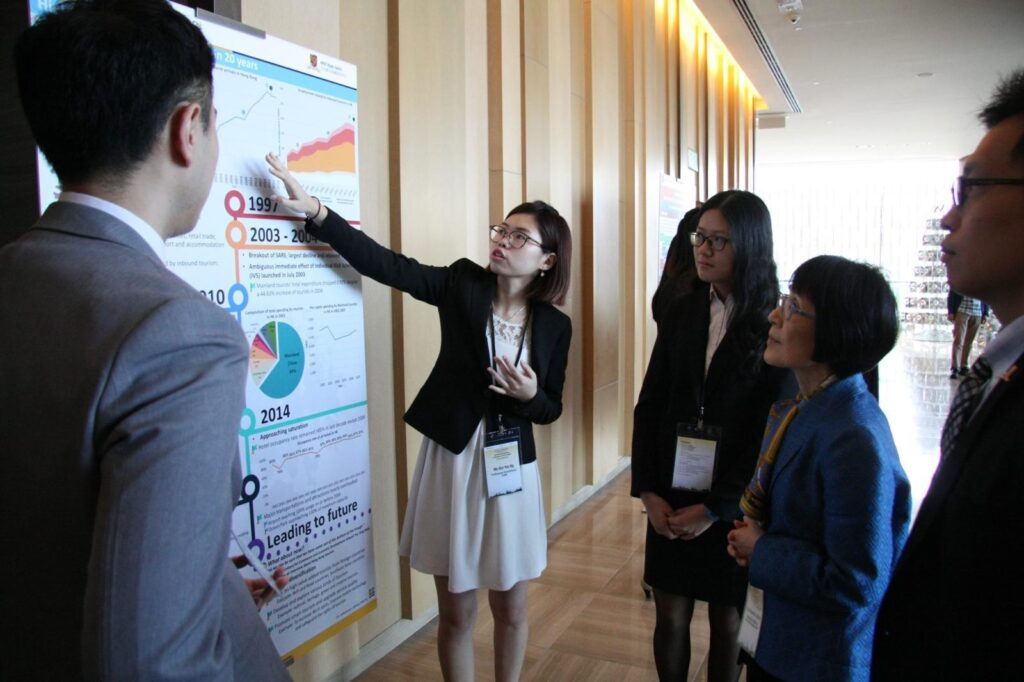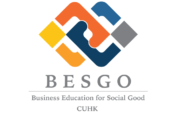Inclusion of the Hearing Impaired: A Loving Story of a Sign Language MOI Teacher 聾生的守護天使 — 手語教師的故事

本文章的中文版本在英文版本的下方。
BESGO*, an acronym of Business Education for Social Good, is a newly inaugurated program funded by CUHK with its aim at educating our youngsters on how social good, creating shared value (CSV), social innovation (SI), social entrepreneurship (SE) and corporate social responsibility (CSR) shape today’s economies, as well as how all these will sculpt the future of our society.
Effort for Inclusion
Recently, one of the program’s Honorary Associates, Anita Ng, divulged a loving story of her own during an interview conducted with BESGO. Miss Ng, alumna of CUHK, graduated from Professional Accountancy and minored in Linguistics (Hong Kong Sign Language). After graduation, she has started working as an Economics teacher for deaf and hard-of-hearing (DHH) students using sign language as medium of instruction (MOI).
What was the underlying reason that caused Anita to become a sign language Economics teacher rather than pursuing a career in the “Big Four” accounting firms? It all began when she had confirmed after a period of internship that the field of accountancy was not where her passion resided. With her newfound realization, she altered the direction of her career path by joining a program established by the CUHK Business School professors called Young Economist Scheme, which aimed at offering tutorial and mentoring service for underprivileged high school students. It was then she started to discover her real passion. She felt inspired with teaching students of different backgrounds and of different needs. Well trained in sign language, she later came into contact with some organizations that aimed to provide sign language support towards hearing-impaired people, laying the foundation to her new career path of being a sign language MOI teacher.
What It Takes to Sign
“Many people think that the skill of sign language is not an area of expertise and this belief limits the number of new teachers joining in sign language MOI teaching,” Anita said. She further explained the difficulties facing the field of sign language MOI teaching. The sign language program she attended in CUHK had once been virtually terminated due to the lack of enrollment. Thus, she very much treasured her opportunity of being able to learn and teach with sign language. As well, the sign language MOI teaching centre by which Anita has been employed almost came into closure due to severely insufficient funding for DHH students’ education at the very beginning. Despite the radical challenges, the centre managed to survive. Nonetheless, “it was sad and disappointing to learn after then that a number of DHH students did not recognize the staff and teachers’ devotion, nor did they show corresponding appreciation for this invaluable opportunity of receiving sign language MOI classes,” Miss Ng recalled. “Having no one to back up the efforts in sign language MOI teaching,” she did think of quitting it while it seemed meaningless to carry on. Even so, Anita still persistently offered support to hearing-impaired students so as to letting them receive equal opportunity in education. “I should be taking the initiative to step forward and put more effort in teaching DHH students,” she emphasized on this point when talking about the reason why she was willing to fully devoting herself into this.
Thus far, the Cantonese-based secondary school in which Anita has been teaching was the only partnering school of the Sign Bilingualism and Co-enrollment in Deaf Education Programme. This program was established in 2006 by the Centre for Sign Linguistics and Deaf Studies, CUHK. The program aimed at teaming up teachers of both spoken and sign languages to administer an inclusive MOI education for the two sorts of students at the same time and in the same classroom. This created an inclusive learning environment and presented more accessible options for facilitating the comprehension of course content, like Economics. In this setting, the subject teachers using spoken language were required to have a sense of empathy to accommodate the needs of DHH students and provide adequate visual aids like notes and PowerPoint slides to better present the content of their teachings. All unexpected changes in the lesson plan would greatly increase the burden of the sign language MOI teachers. “It is tough to do live interpretation with sign language for a video if my partner teacher suddenly plays an educational clip without subtitles in the middle of a lesson,” said Anita.
Outside of the classroom, Anita also needed to deal with challenges of various kinds. For example, she had once received messages early in the morning from a hearing-impaired parent who requested her help for an urgent amendment on the schedule of a hospital appointment. Also, in case parents did not know sign language, teachers of sign language would sometimes act as a bridge for the communication between the two generations. Hence, Anita has always been passionate about her job even though the corresponding responsibilities for sign language MOI teachers were more than that of ordinary school teachers.
True Beauty Unveiled
“Care and empathy are regarded as the two major ingredients on the universal recipe for bond building between students of DHH and mainstream groups,” she believed. “All these years as a teacher, I have witnessed many touching moments brought in through the sincerest friendship between the groups. Last year, one of my mainstream students who did not know sign language took the initiative to making friend with a DHH classmate. But they found it hard to communicate with each other and I suggested them to put it in writing. Later on, they finally became very good friends through the pen-and-paper approach,” said Anita compassionately. “Isn’t that what we call intermingling and inclusion?!”
“Hearing-impaired people are the same capable as we are, yet their opportunities offered by the society are apparently thinner,” Miss Ng emphasized. “With considerably less support in Hong Kong against that of the western societies, most DHH students have no choice but to study in the unfittingly equipped mainstream schools as, for the whole city, there is only one DHH inclusive secondary school. Although the Sign Bilingualism and Co-enrollment in Deaf Education Programme generously offers funding and well-rounded supports, not much can be done so far by just a single social program. Having said that, I still wish to encourage all the hearing-impaired people to have confidence in themselves and take positively the genuine care from others.”
And You Are Welcome
This adoring anecdote of the city’s topnotch business talent tenderly demonstrates how proficient business education can do good to our beloved society in ways other than merely out of the industry. Hence, do not self-effacingly impose limitation on how to follow the passion! To date, Anita continues to keep working closely with CUHK in the advocacy of Economics on Hand, which facilitates the inclusive education between DHH and mainstream students. The scheme is managed by the mutual efforts of Miss Ng and Dr. Fred Ku, Assistant Dean of the CUHK Business School. It truly is a meaningful scheme and hopefully, more programs alike will soon be extended to other school subjects as well. If you, dear readers, also find interest in this mission and would like to connect with the scheme managers, please feel free to browse the following websites for more details.
Sign Bilingualism and Co-enrollment in Deaf Education Programme:
http://cslds.org/slco/tc/index.php
Economics on Hand (手說經濟) Youtube Channel:
https://www.youtube.com/channel/UCGSaUs3Fr_PMvARlGaBoBtQ
*BESGO is a program funded by CUHK with its aim at educating our youngsters on how social good, creating shared value (CSV), social innovation (SI), social entrepreneurship (SE) and corporate social responsibility (CSR) shape today’s businesses, as well as how all these will sculpt our society’s future.
聾生的守護天使 — 手語教師的故事
如果你遇見一位有聽力障礙的人,你會怎樣稱呼他/她呢?聽障、傷健?一個無心的稱呼,對聽者卻可能是一種冒犯。從事融合教育的Anita說,我們特別同情的目光和優侍,其實也算歧視,意味著他們與常人不同,帶有缺陷。其實,聽障或聾啞人士更願意被稱為聾人,學生則稱為聾生。「聾人」一詞只是客觀地陳述他們的身體狀況,不含「障礙」之意,所以沒有冒犯意味。
全力以赴,學習手語
「作為聾人教師,我希望提供選擇給學生,讓他們在公平的環境下成長。」
Anita淡淡的一句,看似簡單,但箇中辛酸只有自己知。Anita在香港中文大學會計系畢業,副修語言學(香港手語)。她是一位經濟科教師,用手語教學,走在共融教育的前線,絕非一個普通中學老師。Anita是健聽人士,很多人都會好奇,為甚麼她選擇融合教育,而非炙手可熱的會計行業?這與她的大學經歷有關:Anita曾經到會計師行實習,發現自己對會計工作沒有太大興趣。
在學期間,Anita參加了中大商學院舉辦的「青年經濟學人計劃」,輔導及支援弱勢的文憑試考生。接觸教學工作後,Anita發現自己喜愛與人溝通、協助他人。在整整兩年的時間裡,Anita與不同背景的中學生相處,感受到教育工作的樂趣,令她重新考慮將來的發展。另一方面,Anita副修手語,接觸到不少手語工作者。這些都是她日後踏入手語圈,一步步成為手語老師的原因。
Anita從學習到從事手語教育,中間的經過並非一帆風順。「一直以來都甚少人修讀手語,而且很多人都不認為手語是一個專業。」 大學的手語課程曾因學生不足而未能開班,Anita差點未能副修手語,幸好她最後排除萬難,修畢有關課程,取得副修語言學的資歷。
初試啼聲:以手語教經濟
Anita初任手語導師時,資源嚴重不足,步步為營,部分學生卻並不珍惜得來不易的手語學習機會,令她心灰意冷,一度想過放棄。
「當很多人都不是很支持的時候,真的好像跌落谷底,所做的事都全無意義。」 但這些艱難經歷令她明白,不可將自己的期望硬套在學生身上,更不應苛責這群聽力較遜的學生。聾生的學習能力其實與一般學生無異,所缺的只是一個有心教學的老師。 Anita作為老師,有感自己更應踏出一步,令知識更流暢地傳達給聾生。
Anita現時在「手語雙語共融計劃」的唯一夥伴中學擔任手語老師,任教高中經濟科。學校安排兩名老師一同教導共融班,其中一位老師負責口語教學,另一位則負責手語,讓聾生「有得揀」,自由選擇讀唇或者看手語,理解抽象的經濟問題。在這樣的工作環境下,兩位導師的默契十分重要。老師準備教材時一定要有聾人意識,盡量用投影機展示課業內容,避免單靠口述,讓聾生更易掌握,亦減低手語老師的負擔。儘管老師們已經努力準備,但上課期間仍然困難處處。「最怕partner突然播放沒有字幕的影片,那我在接下來的一小時,都要對著聾生即時傳譯。」 各種突發情況及我們所忽略的細節,都讓手語老師勞神費心,工作量大大增加。
除了教學,Anita在課餘面對的挑戰亦比一般老師多。她曾經一大早接到家長以短訊和視像通話求助。因為家長也是聾人,無法致電醫院更改看病時間,要拜託Anita代勞。此外,不少聾生的家長是健聽人士,不懂手語,老師這個「外人」反而要擔任聾生與家長間的溝通橋樑,促進他們互相理解,減少隔膜。
教學相長,意外收穫
即使手語教學擔子不輕,但 Anita十分熱愛她的工作。「聾生與其他學生一樣的可愛,一樣的氣人。」 Anita笑道。對她而言,聾生並沒有「輸在起跑線」,他們與健聽學生能力相當,對她都一樣重要。聾生雖然聽力不足,但感覺有時比他人更為敏銳,更擅於觀人於微,在溝通方面有時比其他學生更出色。
至於聾健共融,Anita不認為是天方夜譚,只是需要雙方的同理心與關懷。只要雙方踏前一步,共建溝通橋樑,就能相交相知,建立彌足珍貴的友誼。 在她短短的教學生涯中,有過不少動人的場面。
「去年,我有個健聽學生想與一名聾生交朋友,無奈不懂手語,無法好好溝通。我建議他們帶一本筆記簿,用書寫的方式交談。之後我再問他們,他們真的各自拿出筆記薄,寫著寫著,就成了好友。這不正正就是共融嗎?」 她不無激動地說。
聾人絕對有能力融入健聽群體,只是缺乏適當的協助。無奈香港一直不太重視對聾人的支援。單論教育,全香港只有一所推行融合教育的中學,因此大多數聾生只好入讀主流學校,在支援不足的情況下學習。儘管手語雙語共融計劃提供金錢及各方面的援助,卻是勢孤力弱。
「作為前線教師,我與同事就像戰士一樣,每天應付各種困難,為了協助聾人得到一個公平的學習機會而努力 。」
縱然路途艱難,她都奮進向前,不言氣餒。為了進一步推動聾生的共融,除了日校老師的工作外,Anita亦積極與母校合作,推動「手説經濟」計劃,為一眾修讀經濟科的聾生盡一分力。
「『手說經濟』是一個小小的試點,既為協助聾生,亦為聾健共融。感謝中大商學院及老師的支持和鼓勵。期望將來可以把『手說系列』拓展到其他學科,讓聾生有更廣闊的學習空間。」
支援弱勢社群、改變社會並不容易。Anita 的故事讓我們明白,改變社會可以由自身開始,而努力不懈的嘗試和保持初心,就是推動改變的原動力。
「我希望手語教育的同工,好好守護那份幫助聾生的熱誠,亦期望有更多『戰士』加入,一起為聾人教育奮鬥,為聾生編織美好的未來。」
Economics on Hand (手說經濟) Youtube 頻道:
https://www.youtube.com/channel/UCGSaUs3Fr_PMvARlGaBoBtQ
Student Reporters: Lam Tat Hin (IBBA/2), Wong Hong Ting (IBBA/2), Chow Shuk Wa (HIST/3) and Lam Mei Suet (IBBA/2)
